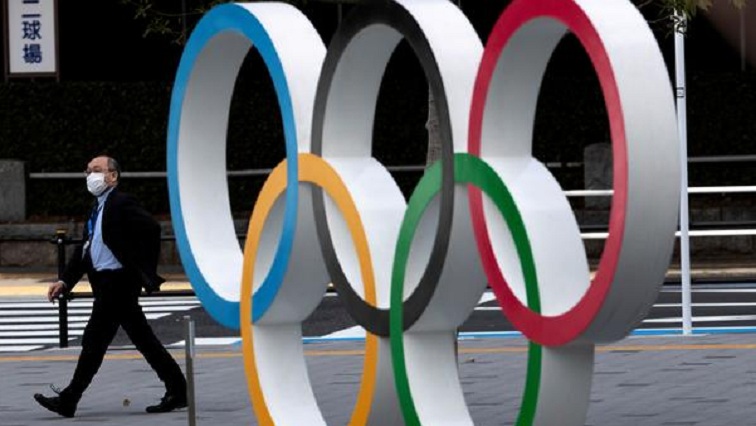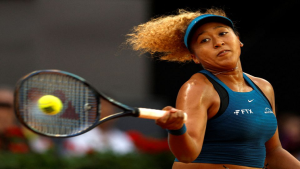Battered by scandal on the eve of the opening ceremony, Tokyo 2020 organizers have the chance to patch up the Games’ image when they reveal today who will carry the Olympic flame for the final few steps to light the stadium’s cauldron.
The identity of the final torchbearer is one of the Games’ most closely held secrets yet speculation has swirled for months around well-known athletes including Naomi Osaka, the four-time Grand Slam tennis champion, whose superstar status could also draw attention away from the string of gaffes by organizers in the build-up to the Games.
The event’s director was fired on the eve of the opening ceremony after comments he made about the Holocaust in a 1990s comedy sketch resurfaced and sparked a public outcry.
Days earlier, the ceremony’s composer stepped down after comments he made in interviews in the 1990s about abusing and bullying classmates were circulated on social media.
And former Tokyo 2020 chief Yoshiro Mori was forced to quit early this year after he made sexist comments about women talking too much.
Japan has also come under fire for holding the Olympics in the midst of the pandemic.
Two-thirds of people said they doubted that Japan could host safe Games, with more than half saying they opposed the Olympics going ahead, according to a recent poll.
Tokyo 2020 organizers said three more athletes had tested positive for COVID-19 bring the total to 11 since July 2. All Olympic-related cases, including officials and media, rose by 19 to 106.
SPORTING ICONS
Naomi Osaka (23), with a Haitian father and Japanese mother, represents a more modern and diverse Japan and is a voice supporting racial and gender equality in a ceremony where many countries are promoting athletes with a message of diversity. Named by Time magazine as one of the most influential people in the world for the past two years, she is Japan’s most recognizable athlete.
Ichiro Suzuki (47) an icon of Japanese baseball, won fame both in Japan and the United States as a player of the Seattle Mariners and New York Yankees. His move to the United States garnered criticism at home, but he won over skeptics with a career that saw him in 2016 reach 3 000 hits, a feat only a handful of players have achieved. Known for his focus and hard work he is often held up as a symbol for children to aspire to.
Shohei Ohtani (27), baseball all-rounder is the latest Japanese player to score big in the United States after joining the Los Angelese Angels in 2018. Earning the nickname Showtime, the left-hand batter and right-handed pitcher is known for his good looks and cool demeanor.
Tadahiro Nomura (46), the judo champion is the son of an Olympic gold medalist, who began learning Japanese martial arts when he was a child. Nomura picked up his first Olympic gold medal in Atlanta in 1996, followed by his second in 2000 and a third four years later to become the first person to take three consecutive judo golds.
Kosuke Kitajima (38), two-time breaststroke gold medalist and former world record holder retired in 2016, but remains a popular figure in Japan, appearing on television as a commentator and celebrity. He is also the general manager of the Tokyo Frogs, a professional swim team that competes around the world and is active in promoting swimming lessons for children.
Saori Yoshida (38), Olympic wrestling champion who also won 13 straight world championships, is admired for her dedication to a sport she began at age 3 with a strict training schedule that was overseen by her father, a one-time national champion. She is known for her lobbying to keep wrestling as an event in the 2020 Games after the International Olympic Committee said it was considering dropping the sport.
RECOVERY
Yet some commentators have called for a non-celebrity who would represent the country’s recovery from the 2011 earthquake and tsunami that caused the Fukushima nuclear disaster, devastated Japan’s northeast coastline and killed nearly 20 000 people.
Japan made a similar choice in 1964 – the last time Tokyo hosted the Games – when Yoshinori Sakai, a 19-year-old college athlete born in Hiroshima on August 6, 1945, the day of the US atomic bombing, brought the flame into the stadium.
Whoever carries the torch on Friday, the new stadium, built on the same site as the one used for the 1964 Games, will be nearly empty, with only around 950 people, mostly officials and journalists, watching in the stands.
Yet the torchbearer’s face will likely be seen by hundreds of millions of people watching around the world.
As the hours ticked down to the event which starts at 8pm Tokyo time (1100 GMT), Japan’s Prime Minister Yoshihide Suga and Emperor Naruhito met with a series dignitaries who will attend the ceremony, including US first lady Jill Biden and French President Emmanuel Macron.
Close to the stadium, surrounded by metal fences and other barriers, some Japanese gathered in scorching heat to snap pictures.
“I was looking forward to the Olympics. I even had tickets,” said 29-year-old Ryusuke Kawano.





